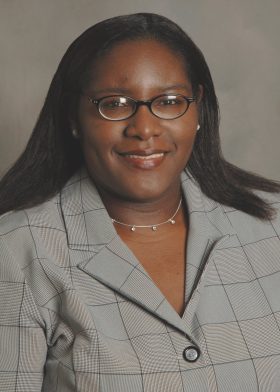Associate Professor Prudence Layne describes in several regional newspapers the fleeting nature of social media hashtags and how only a proper education can effectively combat social injustice.
The following column appeared recently in the Charlotte Observer, the Richmond (Va.) Times-Dispatch, the Baltimore Sun, the (Annapolis, Md.) Capital, the (Greensboro, N.C.) News & Record, the (Burlington, N.C.) Times-News, the Fayetteville (N.C.) Observer, the Savannah (Ga.) Morning News and the Athens (Ga.) Banner-Herald via the Elon University Writers Syndicate. The column in the Charlotte Observer led to an interview about hashtag activism with station WCCB-TV in Charlotte. Viewpoints are those of the author and not Elon University.
*****

By Prudence Layne – playne@elon.edu
Hashtag movements, social media sites and other manifestations of our virtual lives have been designed to cater to a world too busy to engage in the kind of social and political engagement it takes to affect lasting change.
For example, this spring, when an Islamic terrorist group kidnapped 200 girls from their school in northern Nigeria, #BringBackOurGirls was launched across several social media channels. Celebrities, activists, ordinary citizens and even First Lady Michelle Obama posted videos and held placards featuring the hashtag, a well-meaning if not fruitless effort to demonstrate solidarity with victims and their families.
Kidnappings in Nigeria continue to this day, however, and #BringBackOurGirls is almost nowhere to be found. Our attention has since shifted. #YesAllWomen followed a deadly shooting near the University of California, Santa Barbara. More recently, when social media users bullied a 16-year-old rape victim after graphic photos of her sexual assault spread across the Internet, the young victim used the same social media platforms to speak out against her attackers and to protest rape culture. #IAmJada was born.
Over the past few years, hashtag activism exemplified by #Kony2012, #TrayvonMartin and others have provided cover for millions of people whose interest in social justice or political movements is cursory. Ask almost anyone if Joseph Kony was ever captured or if they even know who he is. Ask what they’ve done since the George Zimmerman trial to encourage dialogue or change on race and social injustice. Blank stares are almost all one encounters.
We can’t completely attribute these kinds of responses to the individual or label them solely as superficial. Is the social response justified given that news coverage of some events is too frequently just as shallow and transient?
I understand the attraction of quick actions to support a just cause. When disaster leaves us feeling helpless, texting REDCROSS to 90999 to give $10 becomes second nature. Another mass shooting leads to the customary “smh” (“shaking my head,” for those of us over the age of 30) on social media sites, a precursor to outraged status updates and profile photos that reflect what’s “trending.”
This season of anniversaries commemorating seismic U.S. social change – the Freedom Summer and inner city riots of 1964, and the 1954 Supreme Court decision in Brown v. Board of Education – is yet another reminder that justice requires commitment. That such moments even occurred is testament to the power of faith and sacrifice, the kind that comes from pounding the streets instead of a keypad and gathering in sacred spaces and communities to confront danger rather than hiding in the virtual worlds of avatars, memes and handles that mask our identities and promote irresponsible disengagement.
Truth told, however, it’s not just young people, or Americans, who forget particular causes. Humans simply forget when not engaged. We always remember the people, places and things that are meaningful to the way we order our lives.
While hashtag campaigns are a great way to generate buzz and fund causes, they are only one piece of a larger, more complex puzzle when it comes to creating long-term, radical change to deeply entrenched practices and ideas. They have become the world’s contemporary means of spreading nuggets of information and illuminating otherwise obscure places, peoples and plights, but they should not be considered substitutes for deep engagement.
Such energies require a level of courage we have not seen in the United States since the Civil Rights era, a time when men and women were arrested, hosed, beaten, lynched, burned and brutalized in unfathomable ways. Can any of us think of a cause we find worthy enough to die for?
The answer to that question for many of us is often education. It remains the essential component of all change. Education is why we so often hear stories of women and girls subjected to violence in parts of the world where male domination persists. An education properly used is a threat to all injustice.
But learning without action is just as impotent and dangerous as a “like” of a trend or status update without that deeper engagement. When media gives us a tidbit, we need to learn more by reading, finding people who know more than we do, and engaging in conversations with family and friends. A person properly educated understands that her freedom is inextricably bound to the injustices and threats others face.
She cares about other human beings different than herself and whom she may not know. She feels the weight of her responsibility to act as a vanguard of social change
If we pause long enough to educate ourselves and garner the courage to act on the convictions of our beliefs, we’ll be left with more than hashtags. We may just get up and do something real.
Prudence Layne is an associate professor of English & coordinator of the African & African-American Studies program at Elon University.
*****
Elon University faculty with an interest in sharing their expertise with wider audiences are encouraged to contact Eric Townsend (etownsend4@elon.edu) in the Office of University Communications should they like assistance with prospective newspaper op/ed submissions.


